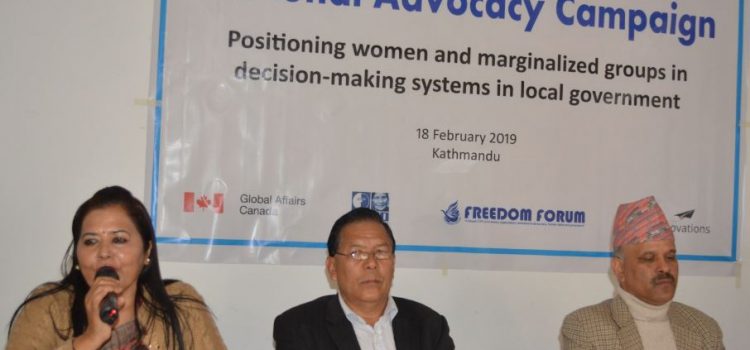In a bid to amplify voice for better participation of Women and Marginalized Groups (WMGs) in the decision-making process and systems in the local government, Freedom Forum organized a National Advocacy Campaign under the Sustainable Use of Technology for Public Sector Accountability in Nepal (SUSASAN) project in Kathmandu on February 18, 2019.
The national advocacy event had brought together total 49 people including a Member of Parliament (member of state affairs and good governance committee), public policy-makers and shapers, experts, media professionals, participants from project districts, representatives from SUSASAN project partners and staffs and practitioners whose role will be imperative to position WMG in decision-making systems.
The advocacy campaign focused on positioning women and marginalized groups (WMGs) in the decision-making systems with the use of integrated technology.
Three themes were prepared for discussion for the advocacy campaign. The themes of the discussion were: Roles and Responsibilities of elected representative from WMGs in local government; meaningful participation of WMGs in local government’s planning, budgeting implementation and monitoring process, and effective engagement of WMGs in different service delivery at local government. Thematic papers on these topics were prepared by Dr. Sangram Singh Lama, local governance and social inclusion expert, Hem Raj Lamichhane, decentralization expert, and Purusottom Nepal, joint-secretary at Ministry of Federal Affairs and General Administration, Government of Nepal, respectively. Bibhusan Bista from Young Innovations, one of the national partners of he project, highlighted the importance of using proper integrated technologies to aid in improving the participation of WMGs in the local government.
Speaking on the occasion, lawmaker Dr Dila Sangraula emphasized on the importance of strengthening the local government and decentralizing power to the local levels. She also added that the various quotas imposed by the government have aided in increasing the participation of women in the local body by a whopping amount and more such policies are being formed.
Among other contributors of the workshop were SUSASAN Project Team Leader Hem Tembe and Governance Advisor Binod Upadhyay.
All of these presentations emphasized the current condition of women and marginalized groups in the decision-making process and how different actions taken were gradually positioning WMGs in the decision-making levels in the local government. A discussion among all the participants in the national level workshop was organized with the aim of providing a road map to the District CSOs to discuss and raise the issues while conducting similar kind of advocacy campaigns at local level. This discussion brought forward the need to identify the potential development and various existing barriers in order to improve the participation of the WMGs in an efficient manner. Constructive suggestions for conducting an effective advocacy were also received from national level experts and policymakers.

While concluding the event, Freedom Forum’s Executive Chief Taranath Dahal stressed the need for positioning women and marginalized groups in the decision making process through integrated technologies.
Also on the occasion, journalist Ranjit Tamang and Freedom Forum Policy Advisor Krishna Sapkota presented the summary of the overall discussion of the whole workshop. This summary indicated that addressing the need of every individual group in the WMG is important to empower them. The system and people in our country still have orthodox thinking and this is one of the main reasons why we haven’t been able to be completely inclusive. There is also a donor-recipient syndrome between the local and central authority. The laws of the government give room for the WMGs and there is substantial potential growth that can be achieved. So, it is important to formulate a legal framework according to the citizen’s needs by taking into consideration the constitutional, political, bureaucratic and physical factors of governance. The key points raised during the workshop can be summed up accordingly.
- Bringing into action the laws and directives promoting participation of citizens, including WMGs in decision-making and governance process at local level
- Amplifying voice for the formulation of necessary laws at local level to leverage the participation of WMGs
- Strengthening knowledge and capacity of people elected representatives focusing those elected from the WMGs as well as the community and citizens for utilizing the legally-defined space for participation
- Analyzing stakeholders to identify strategic actions, plans and policies and align them with the Goal 5 and 16 of the Sustainable Development Goals (SDGs i.e gender equality and peace, justice and accountable institutions at all levels
- Increasing WMGs’ access to information related to planning, budgeting, implementation and monitoring process
- Engaging intermediaries to enable demand side, particularly WMGs in the use of technology for improved access to services and information on decision-making systems
- Improving interfaces between demand side, supply side and intermediaries for augmenting accountability practices
- Building disaggregated data systems at local governments so that there will be granular data on WMGs from different perspectives and plan/policy will be guided by evidence.
For More Information
Freedom Forum
monitoring@freedomforum.org.np

